Supreme Court Justices Question Native American Adoption Law
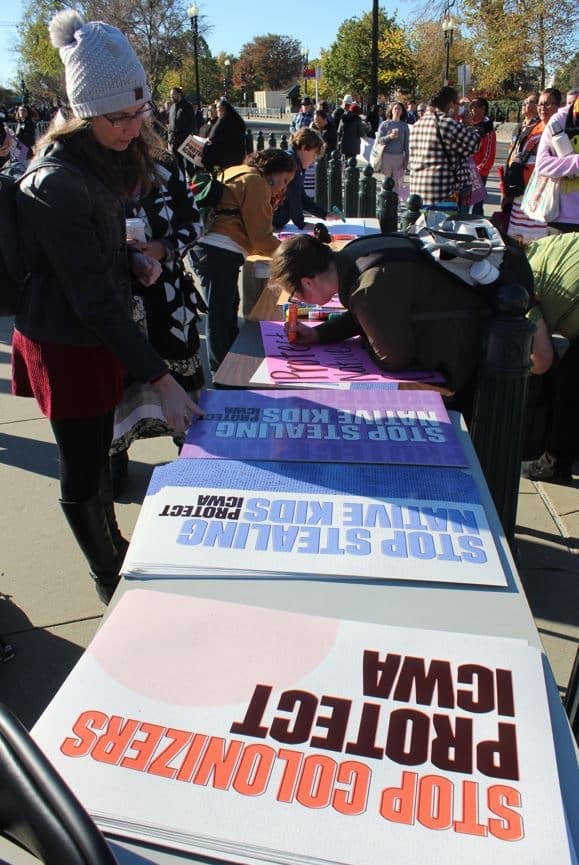
WASHINGTON — For the second week in a row, the justices of the U.S. Supreme Court showed that trying to get the law right is a marathon, not a sprint.
For roughly four hours on Wednesday, the justices weighed arguments in a consolidated challenge to Congress’ power to regulate Native American affairs when it comes to the adoption of Native American children.
At the heart of the consolidated cases up for oral argument Wednesday morning is the fate of the Indian Child Welfare Act, which was enacted in 1978 to help keep Native American children with tribes whenever possible.
At the time, Congress’ intent was to end the woeful, decadeslong practice of states and even the federal government disproportionately placing Native American children in foster care with someone other than members of their extended families or tribes.
Among the provisions being challenged by the primary petitioners in the litigation — Chad and Jennifer Brackeen, a White evangelical Christian couple who sought to adopt a Native American boy — is one that gives a preference to Native Americans seeking to foster or adopt Native American children.
According to the Brackeen’s and two other non-Native American couples named as petitioners, that aspect of the law discriminates on the basis of race.
Also challenging the law is the state of Texas, which claims Congress should never have passed the law in the first place, and wrongly justified its actions by pointing to Article 1, Section 8, Clause 3 of the U.S. Constitution, which gives Congress the power “to regulate commerce with foreign nations, and among the several states, and with the Indian tribes.”
Central to the state’s argument, according to Texas Solicitor General Judd Stone II, is that the act unconstitutionally “commandeers” states to enforce federal law and that Congress lacks constitutional authority over state child-custody proceedings.
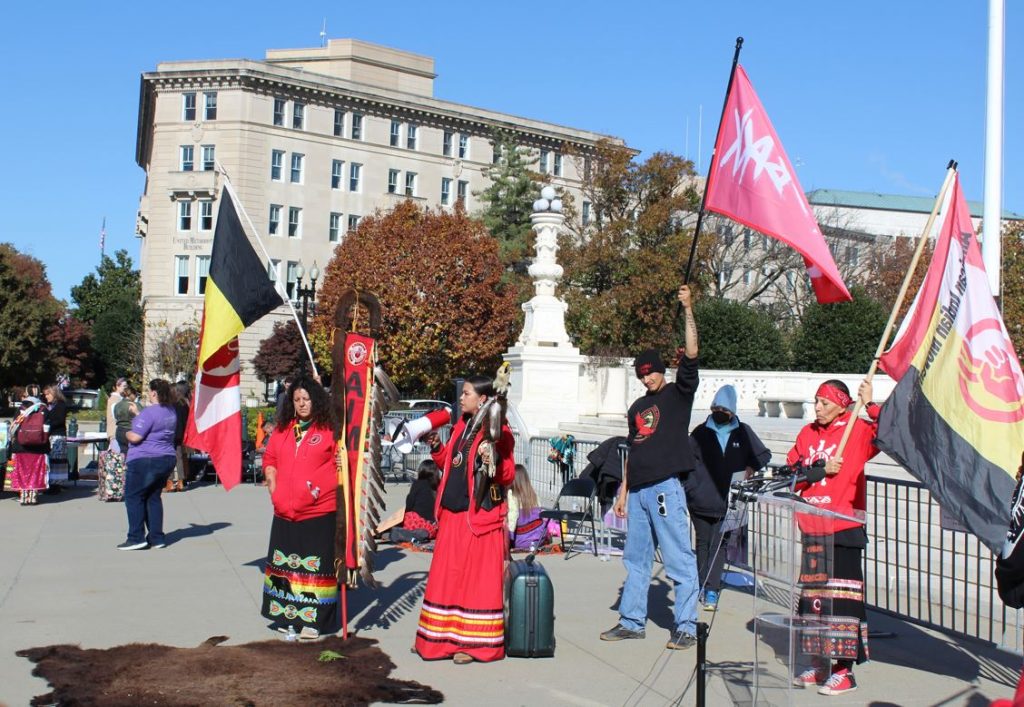
In addition, he said, there is no identified treaty with any tribe that specifically addresses the issue of child custody — although almost all treaties recognize tribal sovereignty — and that children are not articles of commerce and that adoption proceedings are not commercial interactions with Native American tribes.
The tribes, who were represented by Washington attorney Ian Gershengorn, strongly denied that the law discriminates on the basis of race, and said any scrutiny of the law should be premised on the fact that Congress believed it was acting appropriately when it passed the law, and that it also believed its intervention was necessary.
In doing so, he said, he hoped the justices would conclude that the act’s provisions weren’t based on race or even culture, but on the common political relationships the tribes share with the United States.
Over the course of Wednesday’s oral arguments, which lasted into the mid-afternoon, several members of the court’s conservative 6-3 majority appeared inclined to strike down at least some parts of the act, while the three liberal justices appeared to want to let it stand.
And smack dab in the middle — or sort of left of middle — was conservative Justice Neil Gorsuch, who hails from the West, and who sat on the 10th U.S. Circuit Court of Appeals, a jurisdiction which encompasses six states and the territory of 76 federally recognized Indian tribes.
While on the 10th Circuit, Gorsuch’s opinions typically recognized tribes as sovereign governments and addressed issues such as state police incursion onto tribal lands, sovereign immunity, religious freedom, accounting for trust funds, exhaustion of tribal remedies and Indian Country criminal jurisdiction.
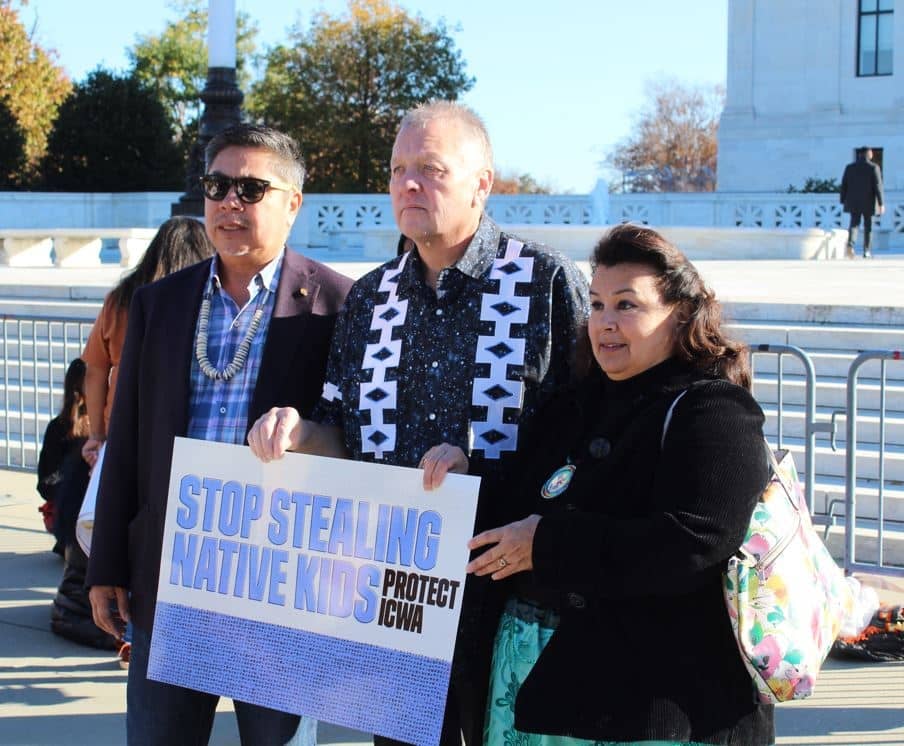
Arguing on behalf of the Brackeens, attorney Matthew McGill noted that by the federal government’s own reckoning, there were over 11,000 Native American children in state foster care in 2020, but there were fewer than 2,000 Native American foster homes in which to place them.
“That means each year hundreds, if not thousands, of Indian children are placed in non-Indian foster homes, and sometimes there they bond with those families,” McGill continued. “Yet, when those families try to adopt those children, ICWA rears its head for a second time, allowing tribes to play the proverbial ICWA trump card at the eleventh hour.”
In the Brackeens’ case, the couple had foster-parented a Native American boy, but were later told they could not adopt him due to the ICWA. They eventually were able to adopt the boy after a potential placement with a Navajo family fell through.
They then sought to adopt their son’s half-sister, who lives with them and is identified as YRJ in court papers, but were once again told ICWA mandated a placement with a Native American family was preferred.
“For a second time, the Brackeens are asked to show good cause to overcome the placement preferences under a new regulatory standard that, in the agency’s words, is narrow, limited, and not a best interests [of the child] test,” McGill said.
“Not even YRJ’s deep attachment to the Brackeens after being part of their family for four years is sufficient. For both that child and her family, this flouts the promise of equal justice under the law,” he said.
Early on, Gorsuch questioned McGill about the scope of his Article 1 argument.
“You argue this whole area [of child placement] is outside of Congress’ control under Article 1,” he said.
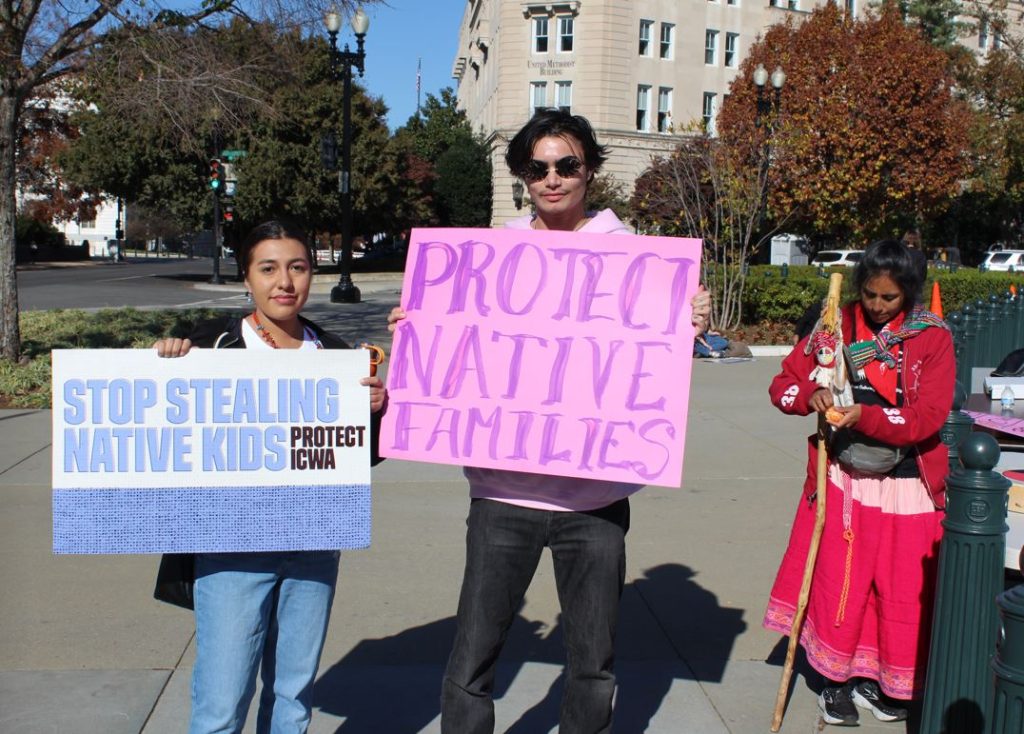
“If your view is … as narrow as … portrayed in your brief, what happens to Congress’ power to regulate health care for Indians off-reservation … or education?” Gorsuch continued, pressing McGill for an answer.
“To the extent that you are regulating articles of commerce,” the attorney began.
“Then health … health care counts?” Gorsuch asked.
“It does,” McGill said.
“So health care counts, but this doesn’t?” Gorsuch asked.
“This is treating children as property,” McGill said. “Our position is that the commerce power does not extend to child placement decisions.”
“So this really has to do with something about family law, I take it,” Gorsuch said.
“This is a family law case, your honor,” McGill said.
“And that’s the core of the problem in your view, that Congress can’t regulate family law matters for Indians off-reservation?” Gorsuch said.
“I think that the core of the problem is, if this is within Congress’ authority, then there is nothing that cannot be regulated by Congress if it touches upon Indians,” McGill said.
After continued give and take between the two, Gorsuch asked whether there was “some irony to your position that you’re here to vindicate states’ rights?”
“We have 23 states who’ve lined up on the other side. We’ve never had a state court, near as I can tell, in the 40-some years since ICWA was adopted complaining about this arrangement,” the justice said.
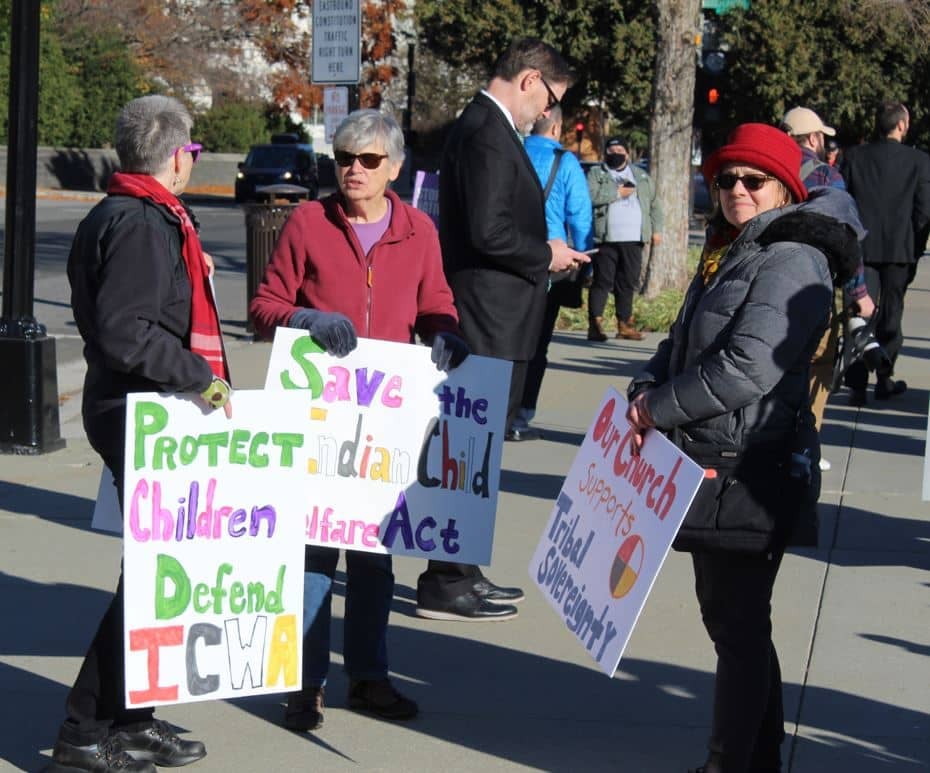
McGill conceded the point, but said it didn’t change his core position.
Deputy Solicitor General Edwin Kneedler, arguing for the U.S. government, argued that the ICWA was enacted “in response to serious harms caused by widespread child welfare practices that resulted in the separation of large numbers of Native American families.”
These placements, Kneedler said, were “often unwarranted” and often resulted in Native American children being placed, through adoption or foster care, in non-Native American homes.
“Over the more than 40 years since its enactment, ICWA has furnished vital protections against those practices,” he said. “There’s no basis for uprooting or overturning Congress’ considered judgment in enacting it.
“ICWA, in fact, is a valid exercise of Congress’ power over Indian affairs in several respects,” Kneedler continued. “That power is grounded in the text of the Constitution, including the Indian commerce clause.”
He went on to explain that power is grounded in the constitutional structure in which Native American tribes occupy a unique status as “dependent” sovereigns.
In Kneedler’s view, the United States owes a duty of protection to the tribe because the federal government and the states aiding it put the tribes in a position of dependency “through treaty and war powers.”
“This duty of protection … in turn encompassed a power of protection,” he said.
“Petitioners’ plea to this court to set aside ICWA on its face would undermine those vital protections that have worked well, as the amicus brief by 23 states shows, since its enactment,” Kneedler said.
“It would also gravely undermine this court’s Indian jurisprudence by carving up Congress’ plenary power into discrete categories, which this court has never recognized,” he continued. “And it would undermine the reliance of Congress, of tribes, of individual members, and, here, states on Congress’ exercise of power.”
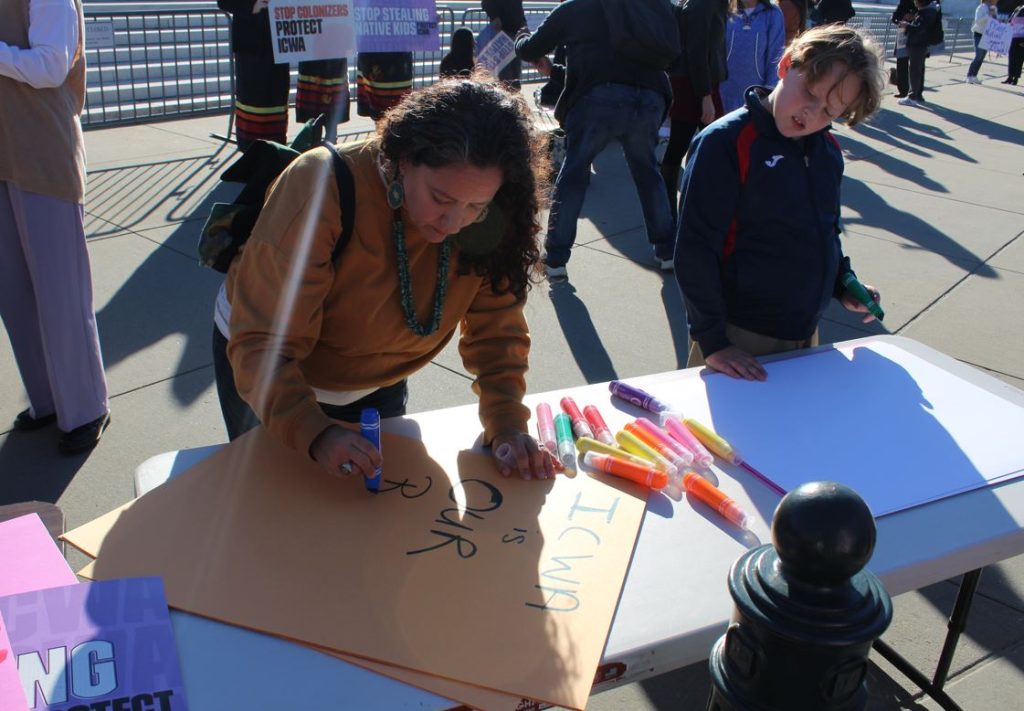
But Justice Amy Coney Barrett said whatever Congress’ overriding intent, the act still seemed to have some problems, namely that it does not appear to recognize the cultural differences between tribes when considering child placements.
“This is just treating Indian tribes as fungible,” she said.
And it was on just that point that Justice Samuel Alito pressed Gershengorn.
“There were several questions earlier about the justification for granting preference for foster or adoptive parents who are members of an entirely different tribe. Could you speak to that? Is that based on the assumption that all tribes are fungible?”
“No, your honor,” Gershengorn said. “It is based on the view that all federally recognized tribes and members of those tribes share a common political relationship with the United States. That’s what renders it political rather than racial. Every member of a federally recognized tribe shares that political relationship.”
“But why is [that] rational?” Alito asked. “Before the arrival of Europeans, the tribes were at war with each other often, and they were separated by an entire continent,” he said.
Gershengorn responded by saying it is common for citizens of one tribe to live on the reservation of another, and that many tribal nations are aligned through a shared culture and history, as well as geography.
“The way this comes up most often, actually, is individual Indians living on the reservation of another,” he said. “And so they are building exactly that community.
“This is not some random tribe plucked from the ether that all of a sudden gets a preference,” he said.
Justice Elena Kagan appeared to agree with Gershengorn.
“Congress is very clear in this statute that it thinks that this statute is critical to the continuing existence of the tribe as a political entity,” she said. “In fact, one of the reasons it passed this statute is because it felt the political entity of the tribe itself was being threatened because of the way decisions on the placement of children were being made.
“I can’t imagine a statute that’s more wrapped up, given the terms and given what we know about what Congress was doing, in the continued flourishment of political communities.”
Chief Justice John Roberts expressed concern over the treatment of adopted children who fall under the ICWA, saying the law could lead to scenarios where “the best interest of the child would be subordinated” to the interests of non-family members of a tribe.
“If I understand what you’re saying, Congress in ICWA made a determination that it is in the best interest of the child to remain with non-family members … on the reservation … in every case regardless of what the alternative is?” he asked.
“No, your honor, not in every case,” Kneedler responded.
A decision in Haaland v. Brackeen is expected by the end of June 2023.
Dan can be reached at [email protected] and @DanMcCue























